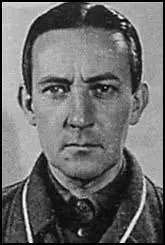Jurgen Stroop

Jurgen Stroop was born in Germany in 1885. He joined the Schutz Staffeinel (SS) and was police leader in Warsaw during the Second World War.
On 19th April 1943 the Waffen SS entered the Warsaw Ghetto. Although though only had two machine-guns, fifteen rifles and 500 pistols, the Jews opened fire on the soldiers. They also attacked them with grenades and petrol bombs. The Germans took heavy casualties and Brigadier-General Stroop ordered his men to retreat. He then gave instructions for all the buildings in the ghetto to be set on fire.
As people fled from the fires they were rounded up and deported to the extermination camp at Treblinka. The ghetto fighters continued the battle from the cellars and attics of Warsaw. On 8th May the Germans began using poison gas on the insurgents in the last fortified bunker. About a hundred men and women escaped into the sewers but the rest were killed by the gas. It is believed that only 100 Jews survived the 1943 ghetto rising.
Later in 1943 Stroop was appointed SS and political leader of Greece. After the war Stroop was arrested and charged with war crimes and was found guilty by an American Tribunal at Dachau. Jurgen Stroop was executed at Warsaw on 8th September, 1951.
Primary Sources
(1) Jürgen Stroop wrote a report on the Warsaw Uprising after it had taken place in 1943.
During the armed resistance, females belonging to fighting groups were armed just like the men. Some of them were members of the Hehalutz movement. Not infrequently, these females fired pistols from both hands. Repeatedly, they concealed pistols or hand grenades (oval Polish hand grenades) in their underpants to use at the last minute against the men of the Waffen SS, police, or Wehrmacht.
The resistance offered by the Jews and bandits could be broken only by the energetic and relentless day and night commitment of our assault units. On 23 April 1943, the Reichsfuhrer SS promulgated his order, transmitted through the Higher SS and Police Leader East in Krakow, to complete the sweeping of the Warsaw Ghetto with greatest severity and unrelenting tenacity. I therefore decided to embark on the total destruction of the Jewish quarter by burning down every residential block, including the housing blocks belonging to the armament enterprises. One enterprise after another was systematically evacuated and destroyed by fire. In almost every instance, the Jews then emerged from their hiding places and bunkers. It was not unusual for Jews to remain in the burning houses until the heat and their fear of being cremated forced them to jump from the upper floors. They did so after throwing mattresses and other upholstered items into the street. With broken bones, they still tried to crawl across the street into housing blocks that had not yet been set on fire or were only partly in flames. Jews often changed their hiding places during the night, moving into already burned-out ruins and finding refuge there until they were found by one of our assault units. Nor was their stay in the sewers very pleasant after the first eight days. Frequently, the sewer shafts carried loud voices upward to the streets, whereupon men of the Waffen SS, Police, or Wehrmacht Engineers courageously climbed down the shafts to bring out Jews. Not infrequently the Engineers would stumble over dead Jews or be shot at. It was always necessary to use smoke candles to drive out the Jews. On one day alone, at a predetermined hour, 183 sewer gates were opened and smoke candles lowered. The bandits fled from what they thought was gas toward the center of the former Jewish quarter, where they were pulled out of the sewer holes. An indeterminable number of Jews were finished off when sewers and bunkers were blown up.
The longer the resistance lasted, the tougher became the men of the Waffen SS, police, and Wehrmacht, who tirelessly fulfilled their duties in true comradeship and stood together as exemplary soldiers. Their mission often lasted from early morning to late at night. Nightly search patrols, with rags wrapped around their feet, dogged the Jews and gave them no respite. Jews who used the night to supplement their provisions from abandoned bunkers and to make contact or exchange news with neighboring groups were often brought to bay and finished off.
Considering that the greater part of the men of the Waffen SS had been trained for only three or four weeks before this operation, they must be given special recognition for their daring, courage, and devotion to duty. It must be noted that the Wehrmacht Engineers also executed their tasks of blowing up bunkers, sewers, and concrete houses with tireless devotion. The officers and men of the police, many already with experience at the front, again acquitted themselves with devil-may-care valor.
Only the continuous and tireless commitment of all forces made it possible to apprehend and/or destroy 56,065 Jews. To this confirmed number must be added the Jews who lost their lives in explosions, fires, etc., whose number could not be ascertained.
